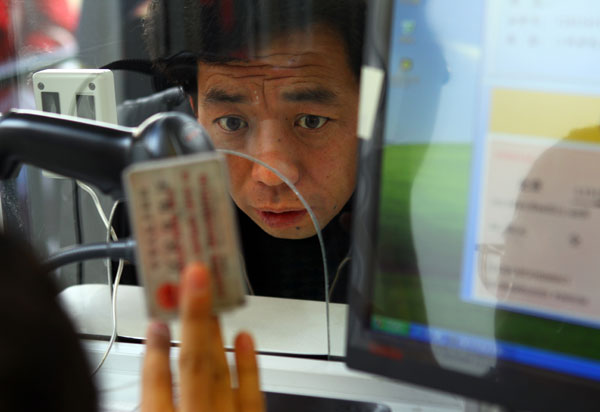Nationwide rush for home kicks off
Updated: 2012-01-09 07:35
By Xin Dingding and Xu Wei (China Daily)
|
|||||||||||
 |
|
A worker at Beijing Railway Station checks a passenger's ID and ticket as the Spring Festival travel season commenced on Sunday. Zou Hong/China Daily |
BEIJING - The Spring Festival peak travel season started on Sunday with tens of millions of passengers, mainly migrant workers and college students, on the move in the world's largest seasonal migration.
It is estimated that the rail system will handle 235 million passenger trips in the 40 days, or 5.88 million passenger trips each day.
Some 34.88 million trips by air, and 2.85 billion road trips, will be made during the period.
The online train ticket system has been busy dealing with the huge demand to return home for the most important holiday in the Chinese calendar, a top railway official said.
The national train ticket website (www.12306.cn) received more than 1 billion hits daily from Jan 1-7, Hu Yadong, vice-minister of railways, said on Sunday.
"Some industry experts said the website may have set a record," he said, adding at least 10 million people registered at the website.
The annual 40-day travel rush lasts from Sunday to Feb 16 this year, with millions of travelers boarding public transport to journey across the country for Spring Festival celebrations.
Though the weeklong holiday officially begins on Jan 22 (the eve of the Spring Festival), demand for tickets is high for at least a couple of weeks in advance.
Thanks to the national online ticketing system and hotlines opened in the middle of last year, an average of 2 million train tickets were sold in each of the past few days, Hu said.
"It is good to see that one-third of passengers no longer need to queue up for hours at train stations or ticket agencies," he said.
But the website, in its first Spring Festival test, has been overwhelmed at times, disappointing many people who tried to purchase tickets.
Netizens wrote that the website was sometimes unresponsive or tickets allocated for one particular day had already sold out.
Wang Yingchao, a Beijing resident, who bought a ticket for Changchun in Jilin province, said her secret was patience and continuously searching the website.
"You have to keep inquiring to see if a ticket will suddenly become available. I did this for half an hour until a ticket showed up. And it took me another 30 minutes to pay for the ticket," she said.
With so many people trying to log onto the system, queues in front of ticket windows have become shorter.
Li Rongbo, a 45-year-old migrant worker from Dezhou city in Shandong province who works in Beijing, did not expect to purchase a ticket right after he arrived at Beijing Railway Station.
"Based on previous experience I thought I might need to stay at the station for one or two days in order to get a ticket. Never did I expect to get a ticket right away," Li said.
Sunday was the first day that passengers were required to board trains with their identity certificates.
More than 100 checkpoints were set up in Beijing West Railway Station and at least 30 at Beijing Railway Station.
It took about 10 seconds for each passenger to pass a checkpoint.
At Shanghai Railway Station, where 3.5 million passengers will depart before Spring Festival, efficiency was maintained with the help of volunteer university students who answered queries. About 100 armed policemen were also on duty.
James Brown, a Brazilian student studying at Jilin University in Changchun was catching a train at Beijing Railway Station and was relieved to see that the waiting hall was not as chaotic as he had expected.
"In the past there were too many people inside and the waiting room was unbelievable, very crowded," he said. "Now it is okay."
But station staff said the peak was yet to come.
Transport departments estimated the number of passenger trips on trains, planes, boats and buses will reach 3.2 billion during the 40-day travel rush, up 9.1 percent from last year.
To cope with the rush, railway authorities, bus companies and airlines are increasing capacity.
But with passengers increasing each year, tickets are becoming harder to buy for major holidays, said Liu Tienan, vice-minister of the National Development and Reform Commission.
"In recent years, traffic during the Spring Festival peak has increased by an average of 200 million trips year-on-year, or up nearly 10 percent year-on-year," he said.
Transport authorities vowed to ensure safety during some of the coldest days of the year, as "harsh weather" conditions, with fog, rain and snow, were forecast.
Millions were left stranded during the 2008 Spring Festival after the most severe weather in at least five decades crippled key sections of the transport network.
Hu Yadong said that the Ministry of Railways has learned from that incident and will prepare 500 diesel engine locomotives on trunk lines, in case weather disrupts the power supply for electric and bullet trains. At least 1,000 electricity generators are also on standby, he said.
Xie Yu in Shanghai and Wang Xiaodong in Nanning contributed to this story.
- Foreign auto investment no longer 'encouraged'
- Wen urges for more support to real economy
- Caterpillar expands China research center
- China must brace for global shocks: PBOC
- Cartoon industry gets more animated
- Land supply up 37% in China last year
- China to maintain monetary policy 'prudent': PBOC
- Beijing to continue housing purchase restrictions









